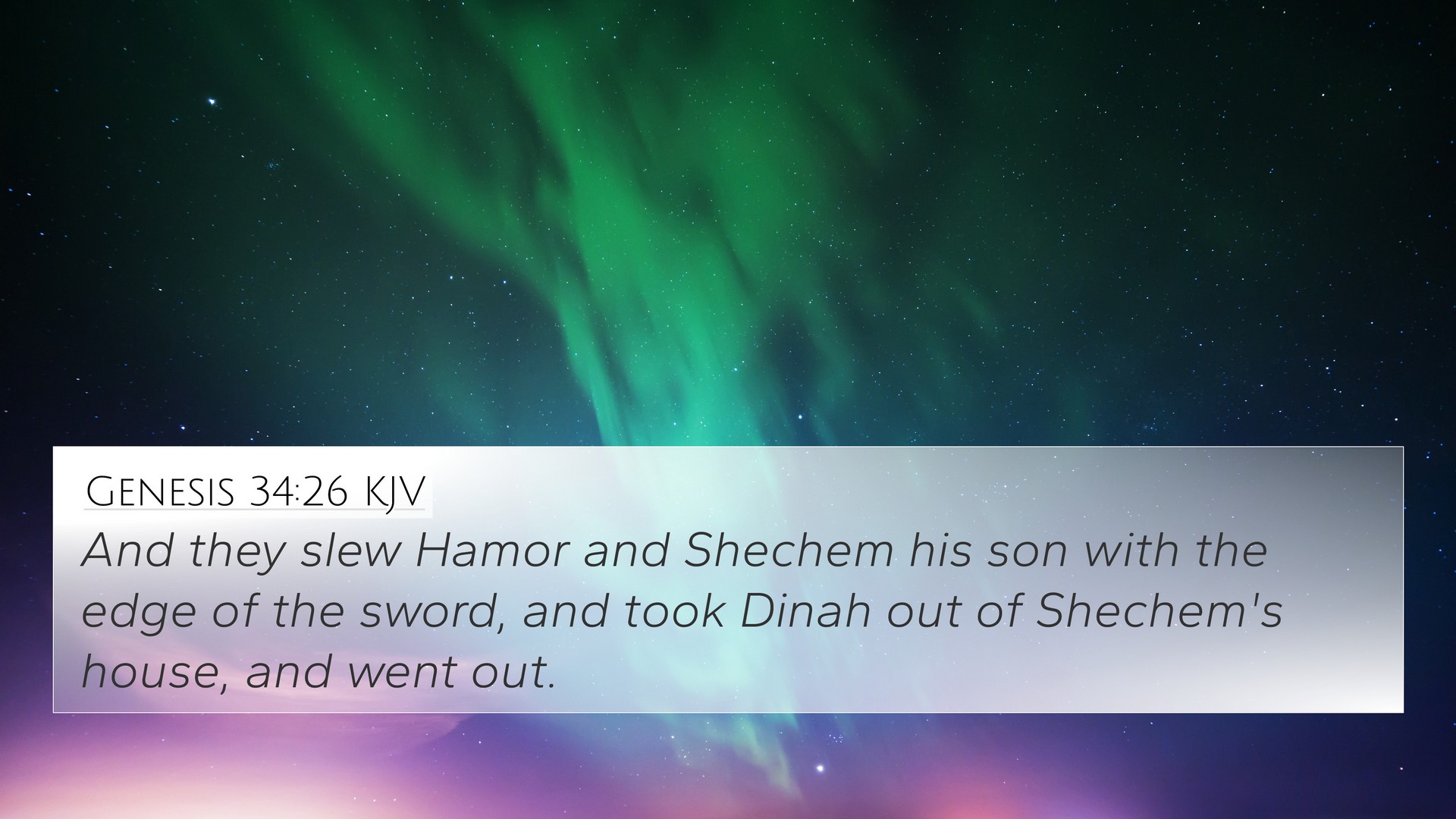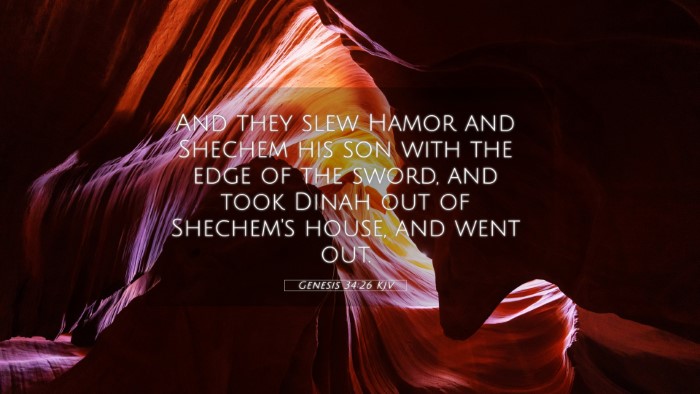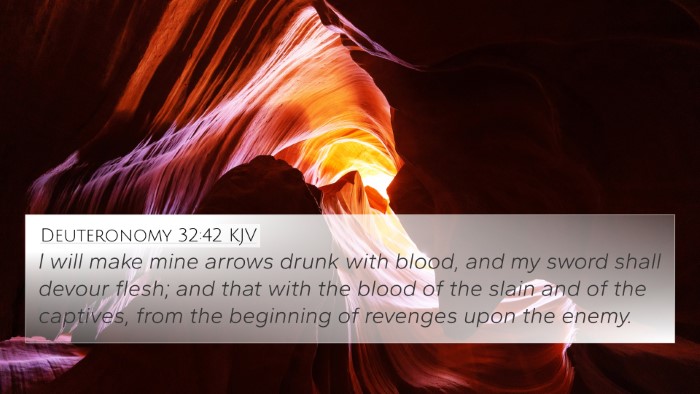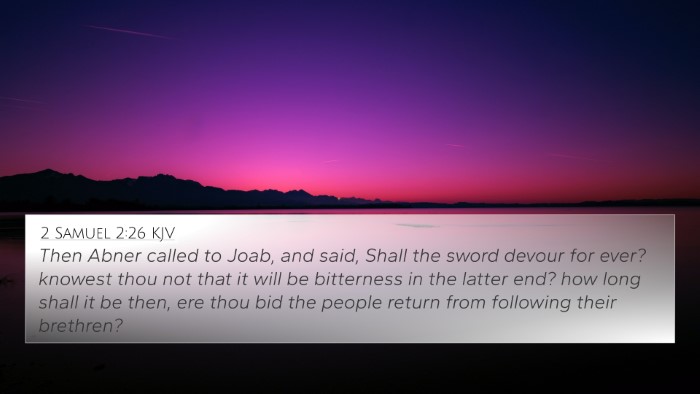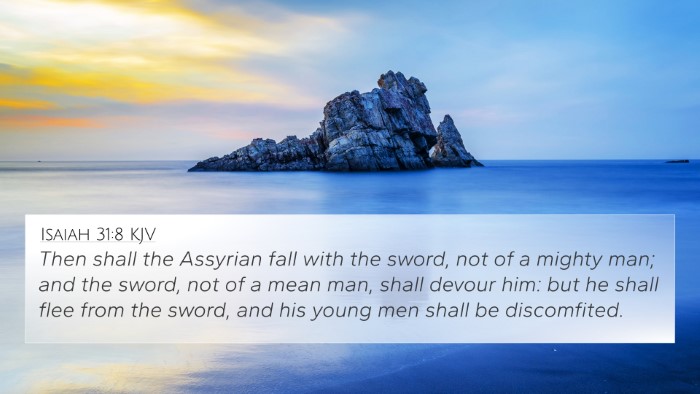Understanding Genesis 34:26
Genesis 34:26 states: "And they slew Hamor and Shechem his son with the edge of the sword, and took Dinah out of Shechem's house, and went out."
This verse occurs in the context of a troubling episode involving Dinah, the daughter of Leah and Jacob, highlighting themes of deceit, revenge, and the consequences of sin. The act of slaying Hamor and Shechem signifies the extreme response from Dinah's brothers, which can be understood through a deeper analysis of the surrounding texts.
Commentary Insights
-
Matthew Henry's Commentary:
Henry emphasizes the gravity of the sin committed by Shechem, who, after forcibly taking Dinah, seeks to marry her, thus compounding his crime. The subsequent violent response from Dinah's brothers is viewed as both a justified act of mourning and a means of avenging their sister’s disgrace.
-
Albert Barnes' Notes:
Barnes focuses on the moral implications of the brothers' actions, noting that their deceptive tactics to betray Shechem and Hamor reflect a broader principle of justice in the context of ancient Near Eastern customs. He argues that their actions bring to light the complexity of justice and vengeance in familial honor.
-
Adam Clarke's Commentary:
Clarke discusses the possible motivations behind the brothers’ drastic actions, posing questions regarding the significance of Dinah's honor and the cultural expectations of the time. He interprets the verse as a culmination of actions driven by both justice and the inherent nature of man to retaliate when wronged.
Thematic Connections
Genesis 34:26 can be interpreted through various thematic lenses, including:
- Justice vs. Revenge: The brothers' actions raise questions about vengeance and the moral dilemmas surrounding retribution.
- Honor and Shame: The significance of Dinah’s honor illustrates the values of ancient cultures where family reputation is paramount.
- Deception and Consequences: The use of deceit by the brothers speaks to the consequences of manipulative behavior as they hatch their plot against their enemies.
Cross-References and Related Verses
Genesis 34:26 connects to several other passages which provide depth to its message:
- Genesis 34:2: This verse introduces the context of Shechem's actions in taking Dinah, setting the stage for the events that follow.
- Exodus 22:16-17: Offers insight into the law regarding seduction and the consequences that arise from dishonoring a woman.
- Judges 19:23-30: A parallel narrative that explores themes of violence and the repercussions of moral failures.
- 2 Samuel 13:10-14: Discusses the violation of Tamar, revealing continuous patterns of family strife and retribution in biblical history.
- Galatians 6:7: A New Testament reminder that one reaps what one sows, applicable to the consequences of Shechem's actions.
- Romans 12:19: The call for believers to leave vengeance to God as a contrast to the brothers' desire for revenge.
- Hebrews 12:14: Encourages followers to pursue peace, calling into question the violent actions taken in this narrative.
- Luke 6:31: "And as you wish that others would do to you, do so to them," a principle in stark contrast to the events described in Genesis 34.
- Proverbs 20:22: Reinforces the idea of trusting in the Lord for justice rather than seeking vengeance.
- Matthew 5:44: Jesus’ teaching on loving one’s enemies stands in opposition to the brothers’ violent measures.
Applying the Insights from Genesis 34:26
Engaging with Genesis 34:26 encourages believers to reflect on the complexities of justice, morality, and righteousness. The verse and its surrounding context invite a deeper understanding of the importance of upholding honor while also seeking to understand the broader principles of forgiveness and reconciliation.
Conclusion
In summary, Genesis 34:26 serves as a crucial text in understanding the dynamics of familial conflict, the repercussions of sin, and the moral actions that arise in response to injustice. Through comparative Bible verse analysis and a focus on inter-Biblical dialogue, we can appreciate the richness and depth of the biblical narrative as it relates to contemporary issues of justice and morality.
